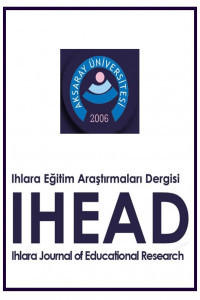SOSYAL SERMAYE ÖLÇEĞİNİN GEÇERLİK VE GÜVENİRLİK ÇALIŞMASI
Sosyal sermaye, güvene dayalı insan ilişkilerinin ürünü olan ve maddi olmayan bir tür sermayedir. Sosyal sermayenin üç önemli öğesi güven, ortak değerler ve iletişim ağları ile birbirine bağlanmanın oluşturduğu grup aidiyeti duygusudur. Başka insanları tanıyor olmak ve o insanlar ile iletişim halinde olmak bir yerde sosyal sermayenin oluşması için yeterli değildir. Bu insanlara güvenmek kendinizi tanıdığınız insanlardan oluşan bir gruba ait hissetmek ve iletişim kurduğunuz kişilerle bazı ortak değerleri taşıdığınıza inanmak gerekir. Bu çalışmanın amacı Sosyal sermayenin her bir boyutunu ayrı ayrı ölçen beş ölçek geliştirmektir. Bunun için güvenin üç türü stratejik güven, genelleştirilmiş güven, kurumsal güven; ortak değerler ve gruba ait olma özellikleri dikkate alınarak 5 ayrı ölçek geliştirilmiş geçerlik ve güvenirlikleri yapılmıştır. Ölçekler 590 üniversite ve üniversite uzununa uygulanmıştır. Stratejik Güven, genelleştirilmiş güven, Kurumsal güven, Ortak değerler, Grup aidiyeti Ölçeklerini oluşturan maddelerin istendik özelliklerde olması, ölçeğin güvenirliğinin ve geçerliğinin yüksek olması, bu ölçeğin Türkiye’de insanların sosyal sermayeye sahip olup olmadıkları, Sahip olanların özelliklerini gösterme durumunu belirmede kullanılabileceğini göstermektedir.
Anahtar Kelimeler:
Sosyal sermaye, ortak değerler, grup aidiyeti, geçerlik, güvenirlik
THE STUDY OF RELIABILITY AND VALIDITY OF SOCIAL CAPITAL SCALE
Social capital is a result of human relations that depend on trust and is a non-material capital. Three important product of social capital are trust, common values and the emotion of belongness created by social networks. ---To know people and to be in touch with them is not enough for the emergence of a social capital.--- To feel belonged to the people that you know, to trust these people, and to believe that you are sharing common values with these people are necessary for the social capital. The aim of this research is to develop 5 distinct measurement tools for social capital that measures each dimension separately. For this, three types of trust; strategic trust, generalized trust, institutional trust; common values and belongness were taken into consideration. Five separate measurement tools were developed and were tested for their validity, and reliability. Tools used 590 subject that are university stundents and graduated.Due to the fact that the validity and reliability tests have proved high, shows that these measurement tools could be used in measuring whether the people of Turkey have social capital and in measuring the details of their social capitals.
___
- Allik, J. ve Realo, A. (2004) Individualism-Collectivism and Social Capital, Journal of Cross-Cultural Psychology, Vol. 35, No. 1
- Brewer, M. B. (1997). In-group bias in the minimal intergroup situation: A cognitive motivational analysis. Psychological Bulletin, 86, 307-324.
- Becker, G. S. (1964). Human Capital. A theorical and emprical analysis, new york.
- Bourdieu, P. (1986) “The Forms of Capital”. Handsbook of Theoery and Research fort he Sociology(ed: Richarson,J.G.) içinde. New york: Greenwood Press.
- Bourdieu, P., Passeron, J. C. (1977). Reproduction in Education,Society and Culture. Londra Sage pup.
- Brehm, J. and W. Rahn, (1997) "Individual Level Evidence for the Causes and Consequences of Social Capital," American Journal of Political Science, 41, 888-1023.
- Coleman, J. S. (1994). Foundations of Social Theory. Belkaknap Pres. Cambridge MA.
- Coleman, J. S. (1988).Social capital in the creation of human capital. American Jurnal of Socilogy,9-94. 95-120.
- Erdoğan, E. (2003). http://www.ari.org.tr/index.php?option=com_frontpage&Itemid=1.
- Field, J. (2006). Sosyal Semeye. (Çev.B. Bilgen ve B. Şen)İstanbul Bilgi üniversitesi Yayınları. (Eserin orijinali 2003 yılında yayınlandı).
- Fukuyama, F. (1998) Güven, Sosyal Erdemler ve Refahın Yaratılması, İstanbul T. İş Bankası
- Kağıtçıbaşı, Ç. (1998). Kültürel Psikoloji, Kültür Bağlamında İnsan ve Aile. İstanbul: YKY Yayınevi.
- Putnam, R. (1992). “Making Democracy Work: Civic Traditions in Modern Italy”, Princeton University Press.
- Putnam, R. (2000). “Bowling Alone: The Collapse and Revival of American Community,Simon and Schuster.
- Taylor, S., Peplau, L. A., Sears, D. O. (2007). Sosyal Psikoloji. (Çev: Ali Dönmez) Ankara İmge yay. (Eserin orijinali 2006 yılında yayınlandı).
- Uslaner, E. M.( 20.9.2002). The Moral Foundation of Trust.University of Jyvaskya Finland Presantation for symposioum.
- Ulsaner E. M.( 2004) “Trust as a Moral Value” Dario Castiglione, Jan W. van Deth, and Guglielmo Wolleb, eds., Handbook of Social Capital, Oxford University Press.
- ISSN: 2528-9624
- Yayın Aralığı: Yılda 2 Sayı
- Başlangıç: 2016
- Yayıncı: Aksaray Üniversitesi
